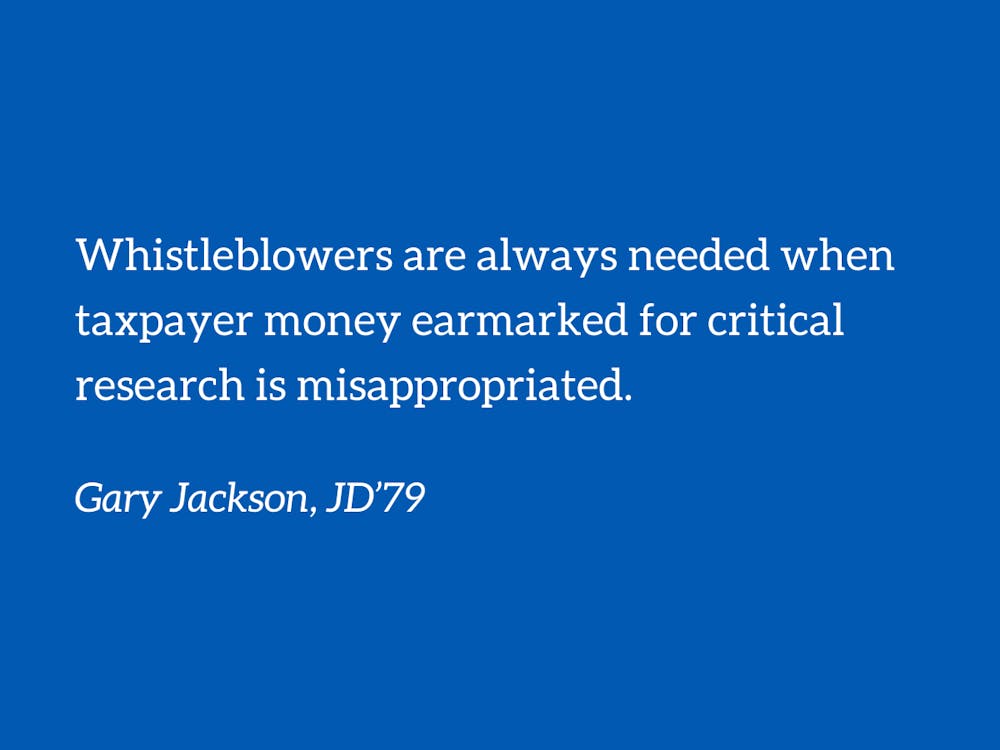As an alumnus of Duke, I’m proud of my school’s preeminent stature and immense capabilities, but also concerned that those qualities should never sour into self-serving, possibly even criminal, conduct. It’s happened before, and it could happen again.
Every year Duke attracts immense sums in federal research grants. In 2023, our School of Medicine took in more than $551 million in funding from the National Institutes of Health (NIH). In doing so, it jumped from No. 9 to No. 7 in national rankings of federal funding for academic medical centers (according to the Blue Ridge Institute for Medical Research).
This huge sum is funded by taxpayers. It then goes to research and development that may someday save your life or the lives of family members and friends. No doubt, Duke’s research has abated the suffering and even cured people close to me.
But did you also know that 2024 marks the fifth anniversary of a landmark whistleblower action against Duke? A former Duke lab analyst alleged that researchers here submitted, in the words of the US Department of Justice, “applications and progress reports that contained falsified research on federal grants to the National Institutes of Health (NIH) and to the Environmental Protection Agency (EPA).”
Duke agreed to pay the government $112.5 million for this alleged violation of the False Claims Act. “Taxpayers expect and deserve that federal grant dollars will be used efficiently and honestly,” said the US Attorney for the Middle District of North Carolina, “May this serve as a lesson that the use of false or fabricated data in grant applications or reports is completely unacceptable.”
But this lesson was possible only because a whistleblower saw something amiss and decided to do the right thing. For his courage, he received more than $33.7 million from the settlement. Yes, you read that right. And this is a point that needs trumpeting at research-rich institutions such as Duke: Whistleblowers are not alone in their desire to do what’s right, and very well could be rewarded.
Individuals who discover fraud — including those at universities — may feel overwhelmed and intimidated by the power of the institution that is home to the misconduct. It can seem like a David versus Goliath battle. But the False Claims Act (FCA) provides each David with an arsenal of incentives and weapons.
Employees or others who have good reason to suspect an organization is cheating can file a qui tam (i.e. whistleblower) claim. Individuals who file whistleblower claims on behalf of the U.S. government may receive compensation anywhere from 15 to 30 percent of the total recovery in some cases.
Further, the FCA offers whistleblowers protection from discrimination, termination, shortened work hours, demotions, an inhospitable work environment and other punishments an employer may consider.
Whistleblowers don’t have to be superheros. They just require a sturdy moral compass and assurance that they can find allies ready to support them. I know from my days as an undergraduate and law student at Duke that the campus is blessed with an abundance of students and employees with moral courage and fortitude.
And the truth is, we need folks like this more than ever. Whistleblowers have recently exposed potentially deadly situations at Boeing, for example. Whistleblowers are holding insurance companies accountable for shortchanging desperate homeowners following hurricanes, which is something our neighbors in western North Carolina could also face. What’s more, whistleblowers are always needed when taxpayer money earmarked for critical research is misappropriated.
Duke is an extraordinary institution. Through a rogue and rare detour from its mission, the school paid dearly five years ago. Let that serve as a reminder for all of us in the university community to be vigilant in guarding Duke’s integrity.
Gary Jackson earned both his undergraduate degree and J.D. from Duke University, 1973-1979. He is an attorney at the Durham-based Law Offices of James Scott Farrin.
Get The Chronicle straight to your inbox
Sign up for our weekly newsletter. Cancel at any time.

